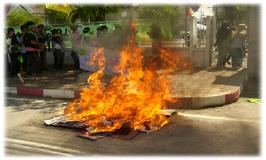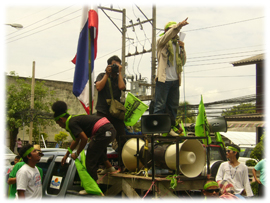Students join in protest against port project in Satun
 “From the old days, the people of Satun have never been starving because Satun is a land of aplenty. Satun is the land that our ancestors explored and built the first town and it is also a peaceful Muslim territory. It is also melting pot of peoples of all religious faiths who co-exist peacefully. We are the sons and daughters of the land of Satun, the land of the South and the land of Thailand…”
“From the old days, the people of Satun have never been starving because Satun is a land of aplenty. Satun is the land that our ancestors explored and built the first town and it is also a peaceful Muslim territory. It is also melting pot of peoples of all religious faiths who co-exist peacefully. We are the sons and daughters of the land of Satun, the land of the South and the land of Thailand…”
The above statement is an excerpt of the declaration of the so-called People’s Network to Follow up the Development Plan for Satun province, a non-governmental organization dedicated to the protection of Satun and against the Pak Bara industrial port project.
The project is a part of the Southern Seaboard development plan under which a deep-sea port will be built at Ban Pak Bara, La-ngu district of Satun province on the Andaman Sea coast in parallel with another deep-sea port slated to be built at Ban Suan Kong, Jana district of Songkhla province on the eastern coast. Linking the two ports together will be a “land bridge” which comprises a network of roads, railroad and oil pipeline.
However, the two deep-sea port projects have been strongly opposed by local people and citizen networks whereas the private business sectors has been fully supportive of the projects as they will help spur economic development in the far South which has been stalled by insurgency problem.
It was reported that the project to transform Pattani into the centre of Halal food industry will not materialize without the two deep-sea ports and the “land bridge”.
Of late, about 1,500 local people, including several students and members of the citizen networks, launched a campaign to express their opposition to the two projects. As part of the campaign, the protesters joined a convoy of vehicles traveling for a 50 kilometre distance from La Ngu district to Muang district of Satun.
 Mr Somyos Tohlang, a key member of the People’s Network to Follow up the Development Plan for Satun, said that the recent campaign was a success as it managed to create awareness about the development projects and their negative implications among more local people.
Mr Somyos Tohlang, a key member of the People’s Network to Follow up the Development Plan for Satun, said that the recent campaign was a success as it managed to create awareness about the development projects and their negative implications among more local people.
“We want the local people to start asking whether the development of Satun province should be decided by people in Bangkok or by people in Satun,” said the activist.
He went on saying that politicians could not be trusted because they themselves were confused about the projects. Some parties said that the projects had been shelved whereas it was reported that the cabinet had given a greenlight to the projects.
The Satun people’s opposition to the port projects have, of late, received moral support from non-governmental organizations in other provinces, such Phatthalung and Songkhla.
Ahmad Kaesamarn, a student of Prince of Songkhla University’s Pattani campus, said he was very pleased that many students had joined the protest against the two projects which, he said, do not reflect the actual need of the local people. Moreover, he added that there was no public participation in the projects at all.
Banyong Masayu, another student, said that students should not only focus on learning in order to get the degrees, but should also participate in social activities.
Ms Preeyarat Sooksomboon, a Rangsit University student, said that the active involvement of Muslim students in the protests against the two port projects should not be viewed by the authorities concerned with suspicion that they could be linked to the southern insurgency movement.
“The Muslim students simply want to help their brothers and sisters to defend their natural resources from being exploited,” she said.
-------------------------------------------------------------------------------------------------------------
Captions : The demonstration against port project in Satun.
